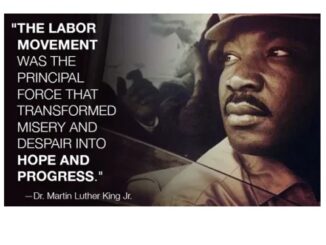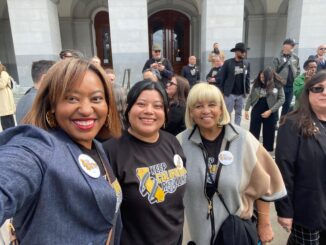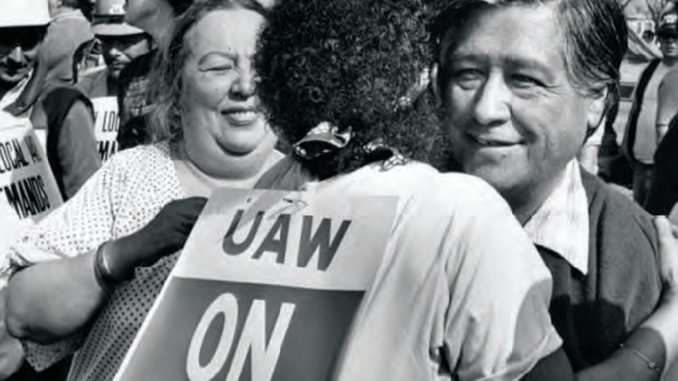
By Rob Callahan
In our recent elections, hopefully you took the time to study the candidates’ statements, to mark the names of the folks you choose to lead the Guild, and to return your ballot. Solidarity and democracy are the twin pillars of unionism, without which our house cannot stand. I want to turn attention, though, not to those names on the ballot, but to the leaders who largely go unnamed. Every muncher of popcorn knows the name of the leading man or leading woman, the big star chewing the scenery. But such performances, of course, are made possible only by a council of department heads coordinating the army of craftspeople laboring off-camera to ensure such scenery is in place to be chewed. It’s those leaders outside the limelight on which so much depends. And the thing about lime-light is that it can blind us to all that falls outside its glare.
The protagonists of the histories taught in my schooldays were often monumental figures. Rulers, martyrs, and heroes — the big stars of history, you might say — that loomed larger than life in our collective memories, their names chiseled in stone, preserved for the ages, repeatedly invoked in appeals to our defining mythology.
Sports fans squabble over who’s the G.O.A.T., but not only in the arena of athletics do we valorize such a notion of a greatness that transcends and defines history. Every culture, subculture, faith, or movement exhibits a similar impulse towards canonizing the greats. We reflexively identify and incant the names of those giants whose shoulders prop up the tales telling us who we are, the colossi who stand for their times and thereby stand outside of all time.
“Yet they were of a different kind,/The names that stilled your childish play,” Yeats writes in “September 1913,” before name-checking Irish revolutionaries of past centuries whose heroism only underscored the supposed debasement of Yeats’s contemporaries. History told in terms of such great figures — great men, almost all of them — is a history told in superlatives, enacted by superhumans, casting long shadows over lesser mortals such as ourselves.
In the labor movement, too, we tell much of our history by name-checking the legendary heroes of our pantheon. The names we invoke are of working-class champions, heroes from and for those who toil, but they are stars still notwithstanding salt-of-the-earth origins: Mother Jones, Joe Hill, Eugene Debs, Big Bill Haywood, Lucy Parsons, John L. Lewis, A. Philip Randolph, Walter Reuther, Bayard Rustin, Cesar Chavez, Dolores Huerta, to call out a handful of our greats. Their names and stories may have been given short shrift in high school history textbooks, compared to the presidents and generals about whom we were taught, but they’re remembered in the labor movement as titans who marshalled the power of working people in epic fights against exploitation.
As instrumental as any leader’s vision, direction, or charisma might prove, though, the stories of movements cannot be fully told as the stories of individual, powerful figures. The grand gestures of particular high-profile personae might serve as useful focal points for telling the history of a movement in shorthand, but the actual work of a movement is carried out by a multitude of hands performing smaller, sometimes even invisible acts. Struggles for justice are always, necessarily propelled from the bottom up, not from the top down.
Our fixation on the great and powerful isn’t a concern just for how we tell our history, though — it also affects how we can understand and shape our present and future.
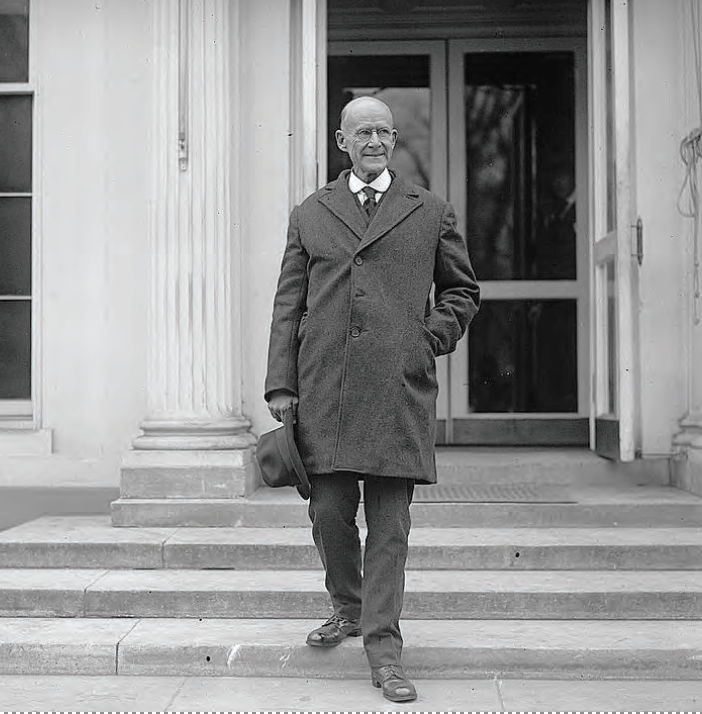
Take our union. Last year, some journalists wrote of our contract fight over the Basic Agreement in terms of the dynamics between the high-profile leaders on each side. “Do-Or-Die IATSE Contract Talks Expected to Continue Friday; [AMPTP President] Carol Lombardini & [IATSE President] Matt Loeb Have Long History of Finding the Deal,” declared one unwieldy headline in Deadline. But such a characterization reduces the complexity of the situation to a drama playing out between just two actors, Loeb and Lombardini, effectively sidelining the more than 50,000 IATSE members who had voted to authorize a strike (never mind an array of studio executives and stakeholders to whom Lombardini was accountable). In a labor movement powered by collective values and collective action, we are done a disservice by narratives framing our story as one of powerful individuals acting in isolation.
Because, ultimately, whatever we may collectively achieve as a union isn’t really up to Matt Loeb — or, for that matter, to Cathy Repola, or even to our elected board of directors, the body that sets official Local 700 policy. It’s up to the 9,000-plus members of the Editors Guild and up to the 160,000-plus members of the IATSE. In the fights ahead of us, each member will need to play an active role; we can’t prevail with members sitting passively in the audience.
In our most recent Guild elections, you might have noticed more names on the ballot than you’re used to. We saw a significant uptick in the number of members running for seats on the board. That’s a good thing. A healthy union is one in which people take an interest in governance, run for office, and engage fully in the democratic process.
But our Guild’s system of proportional representation by classification means that the ratio of members to elected board members is close to 200-to-1. That ratio works fine for a legislative body charged with deliberating and deciding organizational policy, but it’s not a large enough group to ensure that every rank-and-file member has a direct and personal connection to Guild leadership.
It’s for this reason that the Guild seeks to develop an intermediate tier of leaders: Local 700 stewards. The Guild’s stewards comprise a network of grassroots leaders, with close ties to the members in their charge through workplace connections or professional networks. Stewards ensure that individual rank-and-file members know what’s happening with the larger organization and that the larger organization knows what’s happening with rank-and-file members. When contract issues arise in the workplace, workplace stewards work with field representatives and with their co-workers to get those issues resolved. When the union has events or campaigns in which we need members participating, stewards get their coworkers involved. In short, they keep the union internally organized.
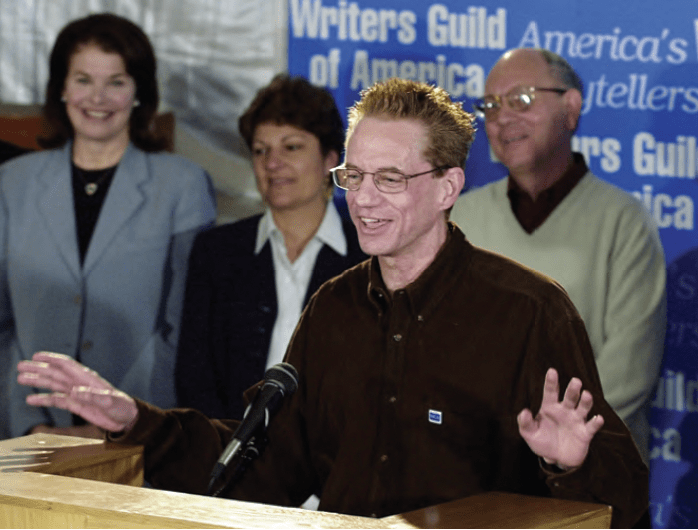
The role of a steward isn’t especially glamorous or glorious. Shop stewards don’t get monuments erected in their honor, and their names will largely be lost to history textbooks. But, as the life-sized leaders closest to the members they marshal, they are key to building and maintaining the solidarity that can make our membership a formidable force.
We will need to muster such a force for the fights ahead.
Last year, more than 50,000 IATSE members voted to invest Matt Loeb with the authority to shut down the motion picture and television industry. It was an astounding show of strength. And make no mistake, it was the membership that made that happen, from the bottom up. Even with such a display, the agreement our negotiators achieved at the bargaining table — objectively the most progress the IATSE had made in a round of Basic Agreement negotiations in decades — left a huge portion of the membership clamoring for still more.
If we are to achieve those aims, we’ll need to head into the 2024 talks with a membership fully engaged and prepared to take action. Such engagement and preparation depend on not only wise leadership at the top, but also upon a strong network of member-organizers — Guild stewards — who can together wrangle thousands of individual members into a cohesive force capable of grinding the industry to a halt.
We need to head into the 2024 talks with members fully engaged.
The fact that ours is chiefly a union of freelancers has always made it tricky to build and maintain a solid network of shop stewards like those found in other unions representing more stable workforces. But we are working to identify workgroups where colleagues do have longer-term relationships with one another and with a common employer, because stewards can lead best when the members in their charge are also their coworkers. For those members who don’t share an employer with a stable group for any length of time, we’re supplementing our workgroup stewards with an infrastructure of at-large stewards whose connection to their charges is based not on shared employment but instead on a common professional or social network.
It is this set of stewards, workplace stewards and at-large stewards alike, that will be the backbone of our union as we face the challenges ahead. Building this back-bone will take time; we won’t recruit and cultivate a corps of rank-and-file leaders overnight. But ultimately we intend to be a stronger union for it.
If you’re interested in stepping into a leadership role and being part of your union’s backbone, learn more about Guild stewardship on our website at www.editorsguild.com/Stewardship.




